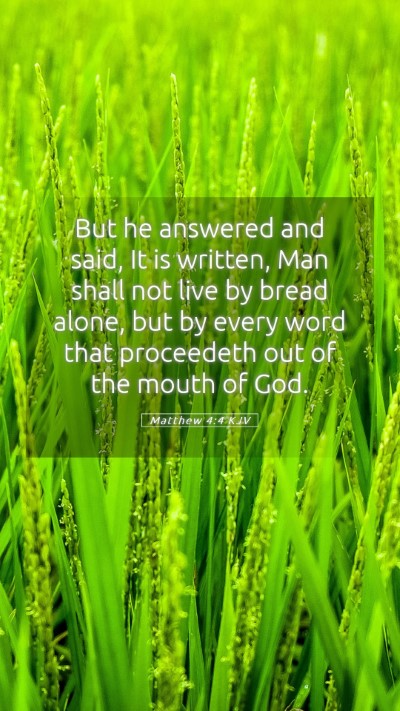Understanding Matthew 4:4
Bible Verse: "But He answered and said, 'It is written, Man shall not live by bread alone, but by every word that proceeds from the mouth of God.'" (Matthew 4:4, NKJV)
Overview
This verse is part of the temptation of Jesus in the wilderness, where He responds to the devil’s challenge. The statement conveys profound theological and practical insights about the necessity of spiritual sustenance.
Meaning of Matthew 4:4
- Dependence on God: Jesus emphasizes the importance of reliance on God’s Word for spiritual nourishment.
- Spiritual versus Physical Needs: The contrast between physical food and spiritual sustenance highlights that mere physical survival is not sufficient for true life.
- The Authority of Scripture: Jesus quotes from Deuteronomy 8:3, demonstrating the authority and necessity of Scripture in guiding believers' lives.
Bible Verse Commentary
Insights from various public domain commentaries depict the significance of Matthew 4:4:
Matthew Henry's Commentary
Matthew Henry reflects on the nature of the temptations Jesus faced. He notes that the first need of man is not bread, which sustains the body, but the Word of God, which sustains the soul. This emphasizes the spiritual aspect of human life and suggests that true fulfillment comes from God's revelation rather than material provision.
Albert Barnes' Notes
Albert Barnes elaborates that Jesus’ reply to Satan was meant to illustrate the principle that life is more than physical existence. He underscores that spiritual food is necessary and that believers are to seek God’s Word for direction. Barnes points out that Jesus, in His humanity, fully accepted the importance of divine sustenance over temporal needs.
Adam Clarke's Commentary
Adam Clarke comments on the Hebrew background of this quotation, explaining how it connects to the Israelites’ experience in the wilderness. He emphasizes that God's provision goes beyond physical needs, offering spiritual guidance through His Word. Clarke adds that Christians must maintain their spiritual health by engaging with Scripture, which reveals God’s will and sustains faith.
Theological Implications
Matthew 4:4 presents significant theological implications for understanding the role of Scripture in believers' lives:
- Divine Revelation: The verse highlights that God communicates His will for humanity through His Word.
- Christian Living: A Christian's life should be guided by and grounded in the teachings of Scripture.
- Spiritual Maturity: Engaging with God's Word is essential for growth and maturation in faith.
Application of Matthew 4:4
Understanding this verse offers practical applications for daily life:
- Daily Scripture Reading: Incorporate regular reading of the Bible to nourish spiritual life.
- Prayer and Meditation: Promote a habit of prayer that seeks understanding and application of God’s Word.
- Community Engagement: Participate in Bible study groups to enhance understanding and fellowship.
Bible Cross References
- Deuteronomy 8:3: Jesus quotes this verse in His response, which provides its original context of reliance on God.
- Luke 4:4: This parallel account of the temptation emphasizes the same principle Jesus articulated.
- John 6:35: Jesus states that He is the Bread of Life, reinforcing the message of spiritual nourishment.
Conclusion
Matthew 4:4 serves as a powerful reminder of the necessity of divine sustenance for spiritual life. It urges believers to prioritize the Word of God in their daily routines, promoting growth and maturity in faith. Those seeking bible verse meanings or deeper bible verse interpretations will find that this verse encapsulates the essence of living in accordance with God's will, drawing attention to the profound relationship between physical needs and spiritual life.


